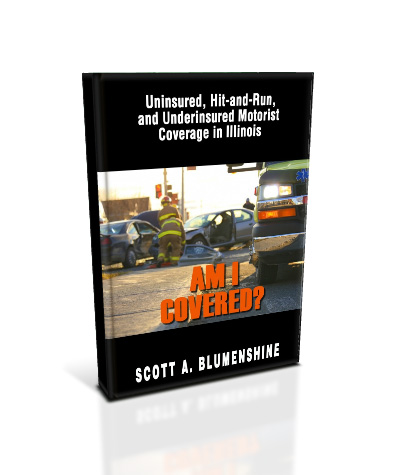If you are seriously injured in a car accident, you may face mounting bills from the hospital, doctors, therapists, auto body shop, and your regular monthly expenses that go unpaid while you are unable to work. If someone else caused the accident, you may feel you shouldn’t be responsible for these bills, and you are right. That’s why Illinois requires all drivers to carry auto insurance coverage. When the other driver is uninsured, your uninsured motorist coverage is there to help you. When the other driver is underinsured, your motorist coverage fills in the gap between the other driver’s liability limits and your underinsured motorist coverage.
What happens if the other driver is uninsured?
If an uninsured driver causes an accident, they may be subject to arrest, substantial traffic law citations, and penalties for driving without insurance. While this may discourage drivers from going without insurance and seeing the other driver charged may make you feel good, it does not compensate you for your financial losses and pain caused by the accident. If you have uninsured motorist coverage, you have a remedy.
What does uninsured motorist insurance cover?
Uninsured motorist insurance coverage is a substitute for the liability coverage the uninsured motorist should have had. It applies to both the driver and passengers, and it covers everything that the at-fault driver’s policy would have covered, including emergency medical treatment, follow-up care, surgery, physical therapy, rehabilitation, medication, lost wages, and other economic damages. Uninsured motorist coverage would also pay for intangible damages, including pain, suffering, disfigurement, and disability. The policy limits for uninsured motorist coverage usually equal your liability coverage.
What You Need to Know About UM and UIM and When You Are Covered
- The policies do not cover you if the accident was your fault. They only provide coverage if the UM or UIM driver was negligent and is the driver who is at fault for the accident.
- If you were using your vehicle for business purposes at the time of the accident, like transporting people or goods for pay, your UM and UIM policy may not provide coverage.
- If the accident was a hit-and-run, most policies require that you file a police report in order to collect damages from your UM policy.
- You are covered if you were the driver or passenger in the car that was not at fault for the accident.
- A person to whom you have given permission to drive your car and the passengers in that car are covered.
- Your policy covers all of your family members who live at home.
- Your minor children are covered no matter where they live.
- Your college-age children are generally covered when living away from home to attend school.
- If you or your family members are injured while a bicyclist, pedestrian, motorcyclist, or bystander, your UM or UIM policy will provide coverage.
- You must file your claim for damages within a certain time, generally within two years, after the accident.
What is the difference between uninsured and underinsured motorist coverage?
Uninsured motorist coverage applies when the at-fault driver has no insurance or cannot be identified (such as in a hit-and-run). Claims are handled directly by your own insurance company.
An underinsured motorist policy provides similar coverage to an uninsured motorist policy but applies when the at-fault driver has a low-limited insurance policy. That means limits such as $20,000 that weren’t high enough to cover your total losses from the accident. You file a claim with your insurance company, but you must first collect from the at-fault driver’s insurance company. You can file an underinsured motorist claim with your own insurance company even if you accepted a settlement less than the maximum limits of the at-fault driver’s insurance policy.
What is my case worth?
- The policies do not cover you if the accident was your fault. They only provide coverage if the UM or UIM driver was negligent and is the driver who is at fault for the accident.
- If you used your vehicle for business during the accident, like transporting people or goods for pay, your UM and UIM policy may not provide coverage.
- If the accident was a hit-and-run, most policies require that you file a police report to collect damages from your UM policy.
- You are covered if you were the driver or passenger in the car that was not at fault for the accident.
- A person to whom you have given permission to drive your car and the passengers in that car are covered.
- Your policy covers all of your family members who live at home.
- Your minor children are covered no matter where they live.
- Your college-age children are generally covered when living away from home to attend school.
- If you or your family members are injured while a bicyclist, pedestrian, motorcyclist, or bystander, your UM or UIM policy will provide coverage.
- You must file your claim for damages within a certain time, generally within two years, after the accident.
Is there a point in suing an uninsured or underinsured motorist?
Drivers who go without insurance or buy policies that are at or just barely above the legal minimums frequently do so because they cannot afford any coverage or better coverage. They are typically low-income individuals, don’t own their own homes, and don’t have significant savings. Because of this, it can be virtually impossible to collect monetary damages even if you bring a lawsuit against them.
You may have to file suit against the uninsured or underinsured motorist to protect your rights. Your auto insurance company has reimbursement or subrogation rights against wrongdoers, so you may be required to preserve those reimbursement or subrogation claims by suing uninsured motorists and turning the case over to your insurer. Time limits and other rules apply to these claims, so please consider speaking to competent counsel before you jeopardize your claims.
Before taking any action, always speak to an experienced quality auto accident lawyer. If you accept an insurance check or sign a settlement agreement, you may lose the right to additional compensation even if you only later discover that you need additional medical care.
Am I suing my insurance company when I make an uninsured or underinsured motorist claim?
Your protection is the purpose of the uninsured and underinsured insurance law. When you make a claim against your insurance company, they should pay the claim. If they do not pay the claim, then you make a demand for arbitration. A lawsuit happens in court. Arbitration happens outside of court. Arbitrators are typically attorneys in private practice, and the arbitration hearings typically happen in the attorney’s office. Scott Blumenshine is an arbitrator in uninsured and underinsured motorist claims.
Many people are concerned that their insurance coverage is jeopardized or their rates will increase if they make a claim. The law in Illinois prohibits insurers from dropping insurance coverage or raising premiums if you make a claim for which you are not at fault. If you have experienced a painful or disabling injury due to an uninsured driver, I would encourage you to consider speaking with a capable experienced injury attorney with a strong record in recovering uninsured and underinsured motorist benefits.
To learn more about uninsured, hit-and-run, and underinsured motorist coverage in Illinois, download Am I Covered?, an eBook by Scott A. Blumenshine of the Blumenshine Law Group. Call or text (312) 766-1000 or email [email protected].


